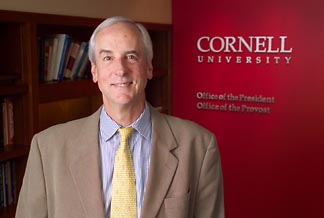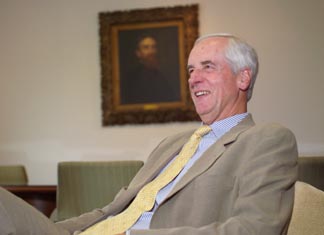Coming full circle with Hunter Rawlings
By Franklin Crawford

The return of Hunter Rawlings to the president's suite in Day Hall is notable in many respects, one of which is that it highlights how much has happened at Cornell University in just two years -- and how many of the changes on campus and abroad arose under his previous watch.
Consider the development of the Computing and Information Science Faculty initiative and the Energy Recovery Linac, the new China and Asia Pacific Studies major, the renovation of White Hall, the renovation and new buildings at Lincoln Hall; the ongoing work on Bailey Hall; the opening of Duffield Hall, the renovations in Statler Hall -- to mention but a few.
There are some interesting symmetries to Rawlings' return as well.
No sooner had Rawlings accepted the difficult appointment of Cornell's interim leader, than he was seen with his shirt sleeves rolled up, hammering out an on-site agreement with students over the building of a parking lot on a certain chunk of now infamous Cornell real estate. That parking lot, currently under construction, was an essential piece of the $200 million West Campus Residential Initiative, also launched during Rawlings' prior reign.
That week, too, there was Hunter Rawlings in City Hall, hand delivering a $1 million-plus check to the mayor (Cornell's annual contribution to the city); the following week, he was addressing a crowd of local movers and shakers at the grand opening of Seneca Place on The Commons in downtown Ithaca. In 2003 Rawlings had attended the building's kick-off celebration, one of the last acts of his previous presidency.
As appealing as such symmetry might be to the public imagination, Rawlings points out that his decision to accept the post -- a mutual decision arrived at simultaneously with his wife, Elizabeth -- was anything but anticipated. The commitment broadsided the Cornell president emeritus and classics professor as he prepped for a busy year of teaching. Rawlings accepted the charge midstride and kept his balance as well as his sense of humor.
"I had to abandon all four of my classes, which is a shame because I was looking forward to teaching those courses," he said. "But I'm happy to take on this position which, some days, is a little bit easier than teaching beginning Latin and other days, a little more difficult."

During a July 26 interview, Rawlings said the search for a new president is "on the fast track" -- corroborated in early August by the announcement that the national executive search firm of Korn/Ferry International had been chosen to assist in the process of identifying and recruiting the strongest possible candidates for the job.
While Rawlings said his term has a short horizon, he doesn't plan "to be simply a caretaker or someone who minds the store." As much as this interim presidency is about stewardship, Rawlings said he intends to "make sure that when the new president comes into Cornell, he or she will find a university that's humming along as well as possible."
After all, he said, that's the way he found it when he accepted the interim position, and he will draw on his previous eight years as president to help guide Cornell through the transition.
"The university is pursuing its priorities very ably right now," he said. "I don't think Cornell's image has been damaged: Clearly an abrupt departure is unsettling in a university's history. But I think it's very clear that Cornell is a very, very strong university that's doing very well in a large number of domains, and I think most people know that very clearly."
Rawlings added that "the short-term goals cannot be narrowed down to one priority. But it seems to me that my job is partly to ensure that the academic initiatives now under way attain momentum. So we want to continue to support the initiatives that have come out of the faculty and the colleges. Secondly, we want to ensure real momentum for the capital campaign."
Toward these ends, Rawlings was upbeat. At the time of this interview, the campaign case statement was well on its way to completion. But even more importantly, the campaign, now in its "quiet phase" of raising a nucleus fund, is on a roll.
"My first few weeks in this position have given me some very fine indications of how loyal and generous our alumni are -- in other words, we're getting some very nice commitments," said Rawlings.
Cornell being Cornell, the campaign agenda is broad. But among the major priorities of the campaign Rawlings cited are life sciences, which includes construction of new physical sciences and life sciences technology buildings, and the social sciences, which have garnered increasing attention at Cornell. The professional schools and the humanities also figure high on the list of development areas.
On the subject of Cornell's commitments abroad, Rawlings said the university's international initiatives, such as the new medical college in Qatar and the new programs in China, have captured a lot of press attention. Concerns that these far-flung enterprises are a distraction from more domestic matters are understandable but are more a matter of perception than fact, he said.
"These initiatives enhance Cornell's reputation internationally, make us more visible as an institution and help faculty and students at Cornell find new opportunities around the world," he said. "So from that standpoint, this strikes me as a win-win situation rather than detracting from the mission at home."
As for town-gown relations, Rawlings referred to the new generic environmental impact statement about to be launched in conjunction with the town of Ithaca that will look at the transportation needs of the entire community.
"We see that as a major collaboration," he said.
On the personal side, stepping in as interim president was a two-person decision, Rawlings said.
"It's a joint decision because you live these jobs together -- and you really do live the job; that's the nature of it," he said. "When asked to do this again, Elizabeth and I just looked at each other and said, 'This is something we ought to do.' So there was no hesitation, no delay, no negotiation. We just said yes. Elizabeth was just as responsive as I was to this opportunity -- if she had not been, I would not be nearly as happy with the situation as I am. So we looked at it as a nice two-year sabbatical we had and now we're back at it."
There's a wonderful personal boon to returning to the seat of power, as well, he said.
"When you're in this position, you meet and spend time with a large number of people," he said. "We haven't seen a fair number of those people in the last couple of years, and it's a very nice prospect to look forward to seeing students, faculty, staff, alumni, state and federal government leaders, and we get to see all those people again and that's a great joy."
As for coming on board amidst the West Campus parking lot hubbub, Rawlings said, "in one sense it was a tough thing to walk into the middle of, but I was responsible for starting the West Campus Residential Initiative. So in some ways, it was quite appropriate for me to try to see it through. I realize that there was very substantial opposition, very vocal opposition, and I must say very thoughtful opposition, which is why we worked hard with students to reach an agreement that incorporates a lot of their thinking into our plans. The students made a number of good recommendations for what the university should be doing with environmental sustainability."
With the fall semester fast approaching, Rawlings' calendar is already full with commitments that reflect his responsibilities as president, and he is ready for whatever new challenges may lie ahead. "During my 10 years of association with Cornell, I have developed a deep commitment to the university, and I am pleased to be able to provide leadership until a new president assumes the office," he said.
Media Contact
Get Cornell news delivered right to your inbox.
Subscribe